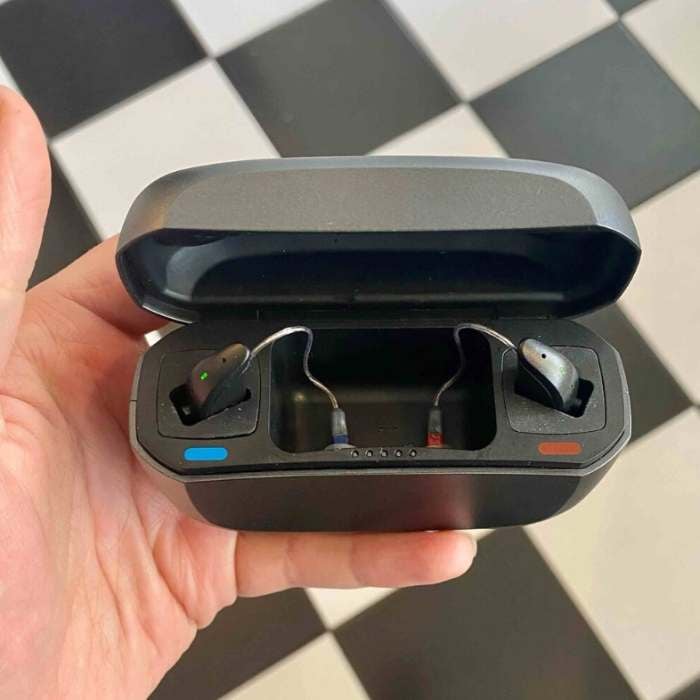On my first day wearing hearing aids, I stepped outside my home as a helicopter flew overhead. I suddenly ducked, thinking the chopper was ready to land in my yard. After a moment, I looked up to see a typical flight pattern hundreds of feet above me.
In those early days, speech was clearer, and I didn't have to turn up the TV, but I also felt like I was hearing EVERYTHING at full volume. My hands brushing against the table, the refrigerator humming, the sound of voices passing my house. You get the idea.
It took my brain around a month to adjust to the sound of hearing aids. My audiologist suggested I wear my hearing aids a few hours daily to start and work up to 8-10 hours daily.
After a month of rewiring, sound through my hearing aids began normalizing. My brain learned to cut out the distracting peripheral sounds and focus on the sounds that were important to me.
If you are adjusting to a new pair of hearing aids, here are some tips that might help.
- Communicate your experience with your loved ones. You may need them to lower their voice or reduce background noise in your first few weeks.
- Spend your first listening hours in quiet and comfortable environments. Your brain will naturally be overwhelmed at the start of your wear experience, and it's best to be somewhere you feel comfortable.
- Instead of taking your device out, try turning down the volume and slowly working it back up.
- Target 3-4 hours of daily wear time for the first week, then add an hour daily until you reach 8-10 hours.
- Talk to your care provider about particularly challenging situations. If specific types of distractions persist, call your audiologist and talk through your experience. Most providers have a wide range of tools to make things more comfortable.
- Use a noise reduction setting in your hearing aid app. Many hearing aids have a "comfort" setting to reduce ambient background noise. Ask your provider to show you how to turn that setting on.
- Be patient with yourself. Everyone who wears hearing aids experiences adjustment differently. Rest assured that your experience will improve.
A note about hearing aid products.
Every new hearing aid wearer goes through an adjustment period. It's just part of the experience.
That said, you'll want to ensure you choose a quality product that can be customized to your specific hearing loss.
Regardless of how much time you spend in a one-size-fits-all PSAP or hearing aid, you'll likely never achieve a natural sound experience if the device is of poor quality.
Fortunately, there are lots of affordable options that do work well. The key is knowing which brands and products to avoid. See our top affordable choices here.
Do I need to wear my hearing aids all the time once I'm adjusted?
Once your brain is adjusted to hearing aids, you might start to wonder, "How much time do I need to wear my devices to protect that hard-earned adjustment?"
Research from MarkeTrak explains, "Experts generally agree that hearing aid users who wear their hearing aids at least 4 hours a day are considered potentially successful users. About 7 out of 10 new users wear their hearing aids 4 or more hours a day compared to nearly 9 of 10 experienced users."
Many hearing aid wearers who now work from home wear AirPods or other headphones during the workday, and that means less time in their hearing aids.
If you wear AirPods for work or working out, upload your audiogram to your iPhone (our guide here). With an audiogram uploaded, AirPods can keep your brain engaged in much the same way as hearing aids.
You want to avoid long periods (days or weeks) where you don't wear your hearing aids at all. These hearing holidays might feel zen at the moment but ultimately restart your adjustment period.
Some science even suggests that periods of audio deprivation can cause longer-term breakdowns in your ability to process sound in the future.
One more thought
As someone who put on hearing aids in my early 30s, I resist the idea that I now have to stick to some rules. The way I see it, my hearing aids work for me and not the other way around.
I don't give myself a grade on how many hours I wear my hearing aids daily. Instead, I think of my hearing aids as a tool and my wear time as a skill builder. I can only effectively use the tool if I keep my skill sharp, which means getting some level of amplification at least a few hours a day.
I hope you've found this helpful. If you are just getting started and have comments or questions, feel free to get in touch at [email protected].






